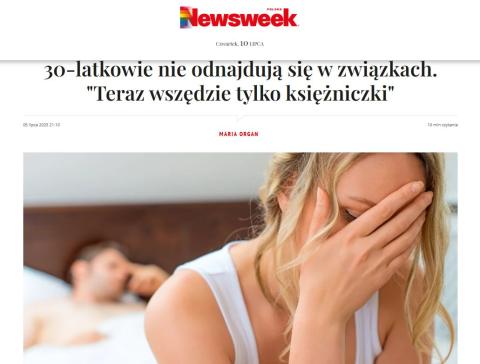
Mediaworker Maria Organ wrote in Newswweg a political agitator entitled “30-year-olds do not find themselves in relationships. Now only princesses everywhere” (]]>https://www.newsweek.pl/Polish/community/30-year-olds-fully-found-in-the- relationship-now-every-sa-only/7kzsjvb]]>) – which shows that she is an officer of a black drunkard. Here's a substantive argument with her false narrative:
From anecdotes to harmful generalizations
Maria Organ's article in Newsweek presents a series of anecdotal stories about failed unions of 30-year-olds to draw broad social conclusions. There is already a methodological problem at the outset: relying on individual cases does not entitle the formulation of general courts. Even if Julia and Pauline’s listeners describe the real phenomena — specified as the difficulty of men to accept their partner’s independency — this is anecdotal evidence. Anecdotes of Julia about 1 partner with a "patriarchal cesspool" or the complaint of Adam about "princess" may attract attention, but they will not replace reliable data. Meanwhile, the article treats these stories as typical of the full group, which is an unfair generalization.
In addition, the author speaks an emotional language and examples selected under a pre-established thesis. This is simply a typical feature of political agyka — first we put the thesis (e.g., “young men are sexists”) and then we choose matching examples. Meanwhile, a reliable publicist should trust on typical statistical surveys, not just on individual stories.
Partial image of the Confederate electorate
The author outlines the image of a Confederate electorate as a young man with a "patriarchal complex" who hates independent women. There are terms like “hidden confilior” or quotes about “some female who can’t keep her legs together”. All blame for world-view conflicts is cast upon young men as unfit to adapt to women's equality. The position of a average Confederate voter is lacking, who could tell about the economical or civic motivations of his views. Instead, the reader receives a message: Confederacy = misogynistic frustrate. It's a hurtful simplification.
What studies say: a image of Confederate voters
Krzysztof Bosak (2020 election)
Exit poll of the 1st circular of the 2020 presidential election shows that Bosak's support had a percent greater share among men than among women — 10.5% of men and 4.6% of women voted for him. However, this does not mean that only misogynists vote for the Confederacy. Qualitative investigation shows that many Bosak supporters are young, well-educated representatives of urban environments who value economical freedom and criticize the current political class. More than half of Bosaka's electorate was little than 30 years old and a crucial percent was made up of people with higher education in the service and IT sectors.
Sławomir Mentzen (elections 2025)
Data from the exit poll I tour of the presidential election on 18 May 2025 showed that 14.81% of voters chose Mentzen. Its electorate was characterized by:
- Gender: 19.7% male vs. 9.8% female.
- Age: 34.8% from 18 to 29, 24.8% from 30 to 39 and falling shares in subsequent cohorts (40–49: 11.2%; 50–59: 7.7%; 60+: 2.6%).
- Education: the highest percent among people with secondary education (17.0%) and somewhat lower in the group with higher education (12.8%), professional (13.2%) or primary (12.7%)
- Place of residence: strongest support in agrarian areas (17.4%), then in tiny towns to 50,000 inhabitants (13.6%), in cities 51 to 200 1000 (13.2%) and lowest in metropolitan areas above 500,000 inhabitants (10.8%)
This data shows that, as in Bosak, the key to the Confederacy's support is gender, age and residence, but at the same time the Mentzen's electorate is more diverse than the article describes. The advanced percent of young men is mostly due to the rebellion against "old politics" and the interest in the liberal-economic programme, not just from patriarchal attitudes.
Publicist or agist?
In the light of these facts, the article by Maria Organ should be considered as an engaged publicist, at times close to propaganda agitta. It combines actual observations with individual anecdotes to confirm the pre-accepted thesis: a young man = a misogynist voter of the Confederate. However, empirical investigation is not drawn to this narrative, and statistical data are utilized selectively.
A reliable reader should look for a fuller image in exit poll results, CBOS reports or qualitative field studies. The Confederate electorate is seen as both traditionalists and libertarians, frequently well-educated, entrepreneurial young people. Simplifications and partial generalizations do not service to realize the phenomenon, but alternatively to strengthen polarisation.
Maria Organ's article is mostly a political pamphlet that speaks more about the author's prejudices than about social reality. To learn the actual motivations of Confederate voters, it is worth reaching out poll data and social investigation alternatively of selective anecdotes.
Grzegorz GPS Swiderski
]]>https://t.me/CanalBlogeraGPS]]>
]]>https://Twitter.com/gps65]]>
















